Advancing Through London
OVERVIEW
London was a great venue for the 2013 Advance! I enjoyed the cultural diversity; it was everywhere all the time! It was busy but there were lots of lenclaves in which one could find some solace: coffee shops, pubs, and wine shops. I enjoyed watching people; London offered a huge window into the fabric of humanity. I took over 120 pictures during the advance and that is a lot of pictures for me. I reviewed my pictures and I do not see any trends. I shot some architecture, lots of people, and historical artifacts. I will include those I liked the most and I will two methodologies, both referenced in Pink’s book Doing Visual Ethnography.[1] In the corpus of this essay I will insert some photos using the caption methodology in which I will assign a textual title to the photo; giving it a caption. Then, at the end of the essay I will include a number of photos without captions, allowing the reader to interpret objectively.
I will use the suggested outline in the Dmin737 for this assignment.
SPECIAL INTERESTS
What sparked my interest at the advance? Beginning on day one … .
- People sparked my interest. Friday night was a great time to be reunited with others in my cohort, our academic leaders, and to meet the LGP4 cohort. To interact with these people was the most important aspect of the entire trip. I affirm the “cohort” approach to the program and I also affirm every way possible to connect the members of the cohort along with the academic leaders. For me, the highlight of the program thus far has been the cohort gatherings in person with our academic leaders, the weekly chats, the tumblr posts, and facebook interactions.LGP3 Reconnects in London!

- On Saturday morning we heard from Jeremy Crossly, rector St. Margaret of Lothbury. He was the most impressive personality I met in London. He is a man of God. I was particularly caught up with his capacity to listen to God, listen to people, and then to trust God that he would speak powerfully into the lives of the busy financiers who come to his office for five or ten minutes. It was worth the trip to London to have this time with Jeremy.Jeremy is a man after God’s own heart!
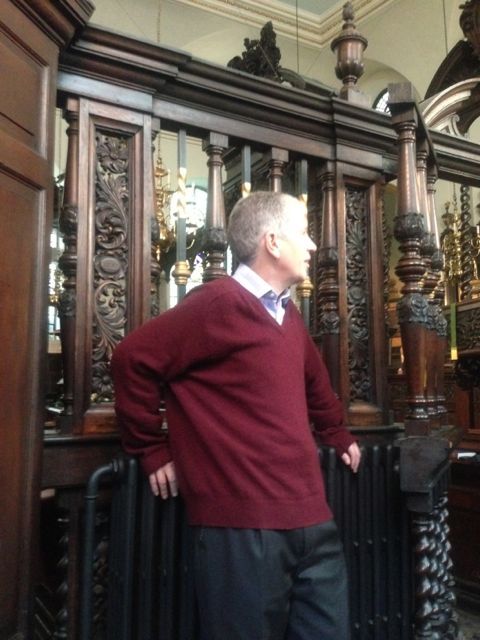
- Jeremy and Parish Mentality. I really appreciated Jeremy’s attitude of a parish ministry. I believe that the move toward congregationally focused ministry as eroded the missional aspect of church life. The parish mentality requires outward focus, not only geographically, but also in regards to the lost people groups nearby. The parish mentality idea was a strong reminder and I have already included the concept and terminology in some presentations I have used in the last few weeks.Jason had the priviledge to interview Jeremy. Jeremy was totally unpresumptuous and completely at ease!
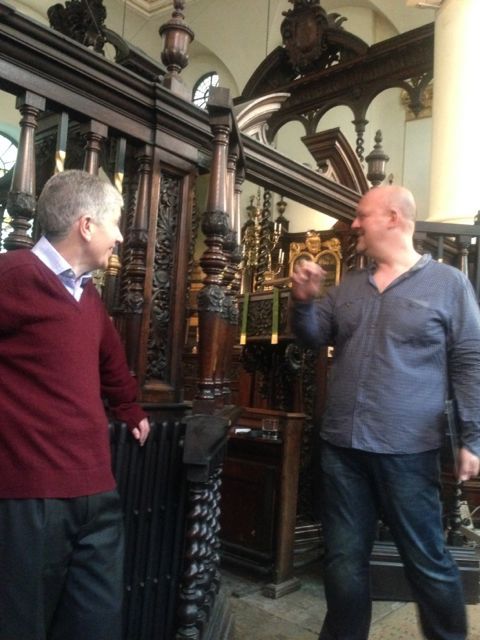
- Lloyds of London sparked some thoughts. The architecture spoke “global.” It proclaimed the interconnectivity and interdependence of global enterprises. The office culture and space proclaimed its historical roots and futuristic attitude.The “Open Architecture” of the offices proclaimed a global vision and global mission.
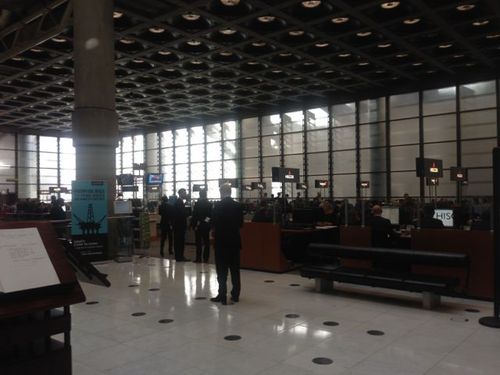 If size relates to strength, then Lloyds is strong!
If size relates to strength, then Lloyds is strong!

- Lunch alone. I had been looking forward for months for some fish and chips. Today was the day. I was taking pictures and then turned around and the group was gone. They went to eat lunch and I had no idea where they were. I found a place to have a bite and enjoyed the solo time after which I found my way back to the group.
- St. Paul’s Cathedral & Evensong. The prayer time was wonderful. It brought back memories from my earlier time as a Catholic. I was reminded that there was some unfinished business in my heart concerning my attitude toward Catholicism. This was the time to deal with that and I did. And God asked me to seal this unfinished business by attending on Sunday. I did. And it was good. Thank you, Lord.If all one sees is this edifice, then one would miss the warmth and personal impact of what it stands for!
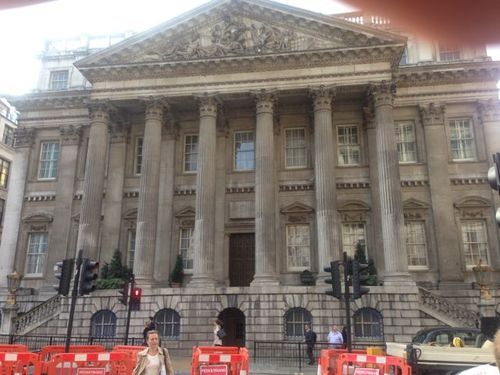
- Shawn Holtzclaw did not say anything new to me but he did remind me about some key ideas: a personal support structure is of critical importance, know my unique “role DNA” and understand how I function according to how God wired me. How can my experiences be leveraged for God’s purposes? Know what I do well and leverage that for God’s purposes!
- St. Paul’s Cathedral, Sunday morning worship. Never thought I would be encouraged to attend a mass. I was. Bill Dobrenen and I had a wonderful time of worship and God removed the shame and guilt of inappropriate remarks and attitude I had carried for many years. Thank you again, Lord.
- The visit to Oasis Church and the later time with Steve Chalke was a good example of a strong business leader functioning in the ministry realm.Oasis Church and Steve Chalke
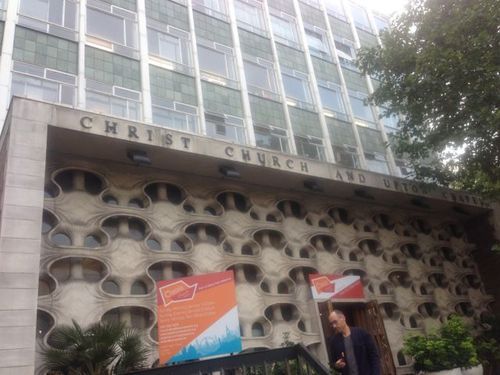
- Krish Kandiah is much appreciated. I had been following him on social media for some time so nothing he said was particularly new. The European Evangelical Alliance is blessed to have his leadership.
- Cohort presentations. The last major aspect of the advance to spark interest was the time for cohort presentations. They were all great. What was most interesting was the unique way in which every person’s personality and interests marked their public presentations. I am honored to tag along this cohort.
- Issues that popped up that sparked my interest:
- For some reason, most likely the personal journey I am now engaging, the issue of personal survival was at the forefront of my mind the whole trip. My future, how I will keep moving forward, did not cease to be in my mind’s eye the whole trip.Who am I? Where am I going?
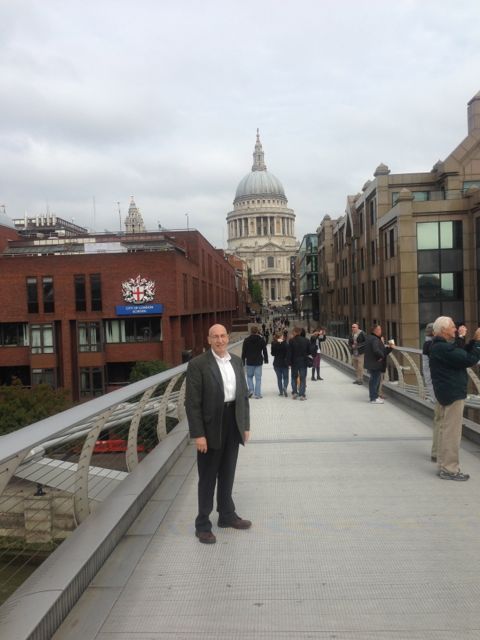
- Another issue that popped up was how some leaders in the faith community continue to compartmentalize their lives and yet be viewed as leadership models. How does this balance with Christ’s call to followership?
- I was reminded of western society’s negative attitude toward age. Perhaps it was the impact of the financial district which pulsated with young energetic people. I was reminded that this is God’s problem, not mine. My problem is my reaction to the issue and my attitude. I am working on that.
- For some reason, most likely the personal journey I am now engaging, the issue of personal survival was at the forefront of my mind the whole trip. My future, how I will keep moving forward, did not cease to be in my mind’s eye the whole trip.Who am I? Where am I going?
- ROI’s.
- I am developing my listening skills and my capacity to hear from God in order to speak something of value for the benefit of another.
- I am in the process of putting together a support group.
- I am concentrating on engaging opportunities that leverage my experiences and skills and honoring God who gave them to me.
NEW KNOWLEDGE OR SKILLS
- Though not necessarily “new knowledge,” capitalistic ideology was strongly reflected in London (not more so, however, than in New York City or other world class cities). Considering this strong capitalistic undercurrent and how spiritual leadership and spiritual formation is exercised and pursued is an important issue to me. I was struck by the importance of embracing a biblical worldview else the brutish nature of raw capitalism would wreck havoc on human kind. Rather than to ignore that ideology, I became more resolute that it must be confronted if serious spiritual formation and ministry leadership is to take place.
- The “softer” skills of leadership are certainly being tooted in recent years. Even the noted business author, Jim Collins, writes about leadership influence from a non-positional power base, “In the social sectors, the Level 5’ s compelling combination of personal humility and professional will is a key factor in creating legitimacy and influence.”[2] The question that emerged in my mind during the advance, however, is what opens doors, the softer skills or performance? Perhaps both, but in this unbridled and bottom line focused world, it seems that performance and brute power is too often winning the day.
PRACTICE
- Since the advance I have used much more media in my teaching and presentations.
- I have used on several occasions the napkin skill presented by Dan Roam in The Back of The Napkin.[3] I have encouraged many to use this tool because of the ease of use but also because it requires a person to think clearly and concretely about the message and how it can be visualized. This significantly increases the audience’s understanding! I believe I am more effective in communicating my ministry, why I do it, how I do it, and how others can engage.
- This skill combined with Simon Sinek’s writing on how to clarify one’s “why”[4] creates a powerful communication strategy. I updated my ministry material to reflect Sinek’s input. I used to emphasize the “what” but I am now leading with my “why.” I now communicate my ministry this way:
- Why: To help people achieve confidence to be and do all that God desires.
- What: Discipling and mentoring willing people to make disciples and leaders like Jesus made disciples and leaders.
- I have also attempted to take my use of social media to the next level even though it is still pretty low! Specifically, on my last trip to Ukraine I did the following:
- I invited all friends and acquaintances to “like” my ministry page (following2lead).
- I took pictures throughout my trip and posted them to the page.
- I updated my status at least once per day, and some days several times.
APPLICATION
Since the beginning of this Doctor of Ministry, Leadership and Global Perspectives program I have regularly been faced with input and opportunity for spiritual and leadership growth. This essay is a very good exercise in that it asks for an assessment of the journey up to the present moment. Here are some of the ways the program has impacted me and how I have applied that impact.
Improved Critical Thinker
I am constantly being challenged and challenging myself to engage good thinking habits and especially before making a comment! Even the basic primer on the subject by Elder and Paul, Miniture Guide to Critical Thinking Concepts and Tools was a good prompter as to the process of developing and reflecting good thinking habits.[5] Most of the books assigned have contributed to the development of my critical thinking skills. But, not only the reading.
Interacting with the program leaders and others in the cohort has been invaluable to my intellectual growth. I do not have the intellectual capacity of Sandra Bils or the deep thinking ability of Garrick Roegner, or the quick wit of Chris Elis, or the depth of Sam Stephens, but I am growing! The chats, the face-to-face times at the advances, and the advance presentations have all contributed to my growth as a critical thinker.
Improved Listener
I help others to engage discipleship and leadership development like Jesus did discipleship and leadership development. The focus of my dissertation is the way Jesus discerned what to say and/or do with his disciples to promote their growth. A big part of that discernment process was Jesus’ listening ability. He promoted listening opportunities, he listened, and then accurately interpreted what he heard which informed his next steps. This program has encouraged me to look more carefully at Jesus’ process in the hope of learning how to adapt his process in my life and ministry. This is making me a better listener.
Better Focused
This program has helped me to better understand who I am and to address my weaknesses, improve my strengths, and leverage my skills. Buckingham’s book Standout[6] was helpful as was a retaking of the DiSC personality analysis. More than these tools, however, the many good books on spiritual formation and leadership have provided rich material to assimilate and then reflect upon. The result is that I have already reduced the breath of my consulting ministry in Eastern Europe. I used to engage church planting consultation but I am now limiting my ministry to discipleship, mentoring, and leadership development. This has taken some courage, or as Friedman would call it, some “nerve.”[7] (His book was one of the best in the assigned reading lists!).
Better Equipped
This last year and half has contributed more to my ministry capacity than any other period of similar length in time. All the important areas have been pressed, pushed, and pulled. I have grown intellectually, stretched emotionally, challenged spiritually, and tuned physically (out of necessity to keep up!). I am in the process of consulting a major mission agency in Ukraine. They want to improve their discipleship ministry and they want to improve their internal (for their own organization) and external (for their recipients) leadership development. I encouraged them to consider an organic approach towards cultural change rather than a programmatic approach and policy implementation. This program has already been a significant contribution to this consultation project.
Several of the books assigned were just in time; they provided immediate and practical information that was applicable to current project issues. Some books have already been noted and in addition is Kets De Vries’ The Leadership Mystique.[8] This book is extremely practical and reflects uncanny wisdom and I have used numerous snippets in my ministry. Cavanaugh’s book, Being Consumed, did much to sensitize me to consumerism.[9]
SUMMARY
My summary captures the most important influences of the program thus far. The most important influence is the people with whom I am making this Dmin journey. Those that have shaped me the most and why are as follows:
Richard Rhoades. Rick’s humility combined with a sensitive yet straightforward perspective has been a tremendous encouragement. When I read his posts I hear his heart. When I hear his voice, I hear his wisdom.
Garrick Roegner. Garrick’s broad intellectual capacity and ability to draw from that well of knowledge and apply it easily is amazing! He also has a tremendous sense of humor! He has influenced me to keep pressing forward in this program.
Sandra Bils. Sandra is a class lady! She brings such empathy and sensitivity to every discussion. She has caused me not to make quixotic or shallow assessments of situations or topics. Her intellectual depth and passion for people has been a strong influence.
Jason Clark. Jason is not only in a position of influence; he has earned the respect and value of all of us. He is a really good listener, he presses forward when he hears or sees an opening that is an opportunity for our growth, and has forced me to think deeper and more carefully.
[1] Sarah Pink, Doing Visual Ethnography, Second (Thousand Oaks, CA: Sage Publications, 2007). Kindle Location 2921ff.
[2] Jim Collins, Good to Great And The Social Sectors (New York, New York: HarperCollins Publishers, 2011). Kindle Locations 152-153.
[3] Dan Roam, The Back of The Napkin (New York, New York: The Penguin Group, 2008).
[4] Simon Sinek, Start with Why (New York, New York: Penguin Group, 2009).
[5] Linda Elder and Richard Paul, Miniature Guide to Critical Thinking Concepts and Tools (The Foundation for Critical Thinking, 2009).
[6] Marcus Buckingham, Standout: The Groundbreaking New Strengths Assessment (Nashville, TN: Thomas Nelson, 2011).
[7] Edwin H. Friedman, Failure of Nerve: Leadership in the Age of the Quick Fix (New York, NY: Seabury, 2007).
[8] Manfred Kets De Vries, The Leadership Mystique (Edinburg Gate: Prentice Hall, 2006).
[9] William T. Cavanaugh, Being Consumed (Grand Rapids, MI: W. B. Eerdmans, 2008).
More photos from the Advance in England that captured my attention for varous reasons. Some captured my attention because of their historical significance, others for their faith significance, some for shear architecture, and some just because I liked them.







Leave a Reply
You must be logged in to post a comment.